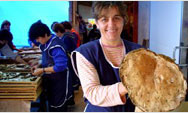USAID Supports Serbian Efforts to Eradicate A “Quiet Killer”
In Serbia, some estimate that domestic violence affects up to half of all women regardless of socio-economic or ethnic status. If victims seek help at all, they often face a legal and judicial system that perpetuates the guilt and shame they already feel, further handicapping them.
In western Serbia's Uzice municipality, for example, police reports from 2003 document only 20 domestic violence cases. And, according to recent domestic-violence awareness
training recently conducted by USAID partner ABA/CEELI, Serbian judges and prosecutors largely view domestic violence as a family matter outside of the courts' purview. But, thanks to several USAID-sponsored projects now underway, Serbia's law-enforcement and legal professionals are becoming better prepared to handle domestic violence cases.
At the grass-roots level, projects are building up Serbian society's ability to support and assist domestic violence victims. In western Serbia, USAID enlisted the help of its partner International Relief and Development (IRD) to establish four SOS Centers. SOS Centers function as information/outreach hubs for the public and provide specialized services for victims.
Created with the help of family and social welfare experts, the project to establish SOS Centers in western Serbia's municipalities of Uzice, Arilje, Pozega, and Bajina Basta included workshops and seminars to educate the public about domestic violence. SOS Centers have telephones and trained volunteers to respond to domestic violence crises. Local donors and the Swiss
Agency for Development and Cooperation (SDC) joined USAID's efforts and helped establish a safe house for domestic violence victims in Uzice in 2004.
According to Uzice's SOS Center coordinator, 10 percent of all calls require direct interventions to protect the victim's life, while many more callers require counseling and psychological care. To better respond to callers' needs, the SOS Centers established a network of case managers in each municipality, trained local teachers, counselors, and medical workers in helping domestic violence victims, and launched a media campaign called "We All Have to Know" to broaden awareness of the new domestic violence support network. As the media campaign became more intensive, calls for help became more frequent.
To date, volunteers have recorded more than 2,000 calls. Only nine victims were men; most of the victims are women with children.
"We help victims realize that they are not alone and that they can take action to protect themselves and their children," said Uzice's SOS Center coordinator. "We help them see that life without violence is possible."
The SOS Centers have also established contacts with other institutions such as the police, health centers, and the public prosecutor to prevent abuse, to stop it, and to prosecute and punish abusers. In further collaboration with the Swiss Government and the OSCE, SOS Centers helped coordinate special domestic violence intervention training for the Pozega police.
At the macro level, USAID partner ABA/CEELI developed domestic-violence awareness materials for Serbian judges and prosecutors. To date nearly all of Serbia's magistrate judges, who handle 95 percent of domestic violence court cases, have been trained using these materials. Work continues to increase Serbian prosecutors' ability to understand and advocate for domestic violence victims. Ultimately, U.S. assistance is helping to create a Serbia where domestic violence is openly confronted and fully prosecuted.
 |
 |
| Marija Terzic, a volunteer at the SOS Center in Uzice, responds to domestic violence crises |
Public awareness poster produced as part of the SOS Centers' "We All Have to Know Campaign” against domestic violence in western Serbia |
Back to Top ^ |


